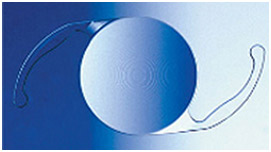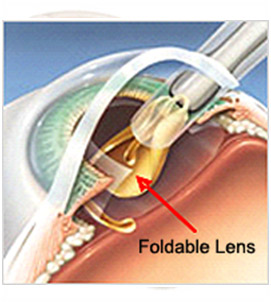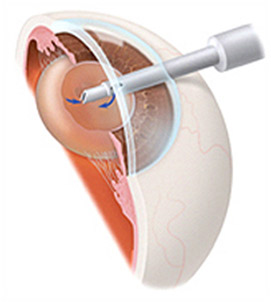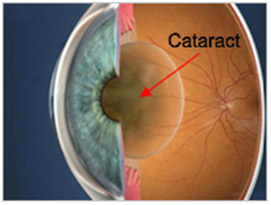What is a cataract?
Cataract Surgery
Intraocular Lenses
A cataract is an eye condition that causes clouding in the normally clear lens of the eye. Cataracts develop due to a build-up of protein, causing blurry, hazy, or less colourful vision in one or both eyes. While many may not notice the development of a cataract at first, over time, a cataract can impair vision significantly, impacting your ability to read or drive, and may even blur vision completely.
How is cataract treated?
While the early symptoms of blurred vision may be improved with contact lenses or glasses, over time vision may deteriorate, and the way to cure a cataract is to remove it surgically. For a cataract that impairs daily life, cataract surgery is advised.
Please contact Dr. York’s office to schedule an appointment for an assessment of your cataracts to see whether or not you require cataract surgery as he will only operate if cataracts are clinically significant.
Cataract surgery
With the continuous improvements in surgical technique and medical technology, the risks and complications of cataract surgery have greatly been reduced, and cataract removal is one of the safest surgeries performed over 14 million times globally each year.
During this eye surgery, the clouded lens is removed and replaced with an artificial lens. Before surgery measurements will be taken to custom make a clear intraocular lens to restore your vision. During surgery, a tiny opening is made, and the clouded cataract is removed and replaced. Once in place, the new lens will become a permanent part of the eye. The whole procedure takes 15-30 minutes, and no overnight hospital stay is required.
Recovery
After cataract surgery, you can expect some mild discomfort for a few days. Healing time may vary, but initially, your vision should improve rapidly. You can expect a full recovery in 2-4 weeks of surgery. You will still need to wear glasses for some tasks and to achieve the clearest possible vision you may need glasses for both distance and near. The standard choice is a monofocal lens which gives you either good distance (driving, outdoors) or near (reading) vision—but not both, or monovision. For specific candidates, there are specialised lenses that can give you both near and distance vision without glasses (multifocal lens) and lenses that correct pre-existing astigmatism (toric lens).
You will be given a chance to discuss your personal preferences with Dr York so that you can make an informed decision on which option is best for you, and he will be able to evaluate if you are a candidate for specialised lenses.
Complications
While complications are rare, they can occur. Complications include:
- Posterior capsular opacification
- Inflammation
- Infection
- Lens dislocation
- Swelling of the retina
- Retinal detachment
Of these complications, many are treatable but may require follow-up treatment or surgery. There are certain health and eye conditions that increase your risk of complications. You should discuss your general health conditions with Dr York prior to surgery.
 Soft-foldable lens implant
Soft-foldable lens implant
 Modern foldable lens implanted during surgery
Modern foldable lens implanted during surgery
 Cataract removal using phaco
Cataract removal using phaco



